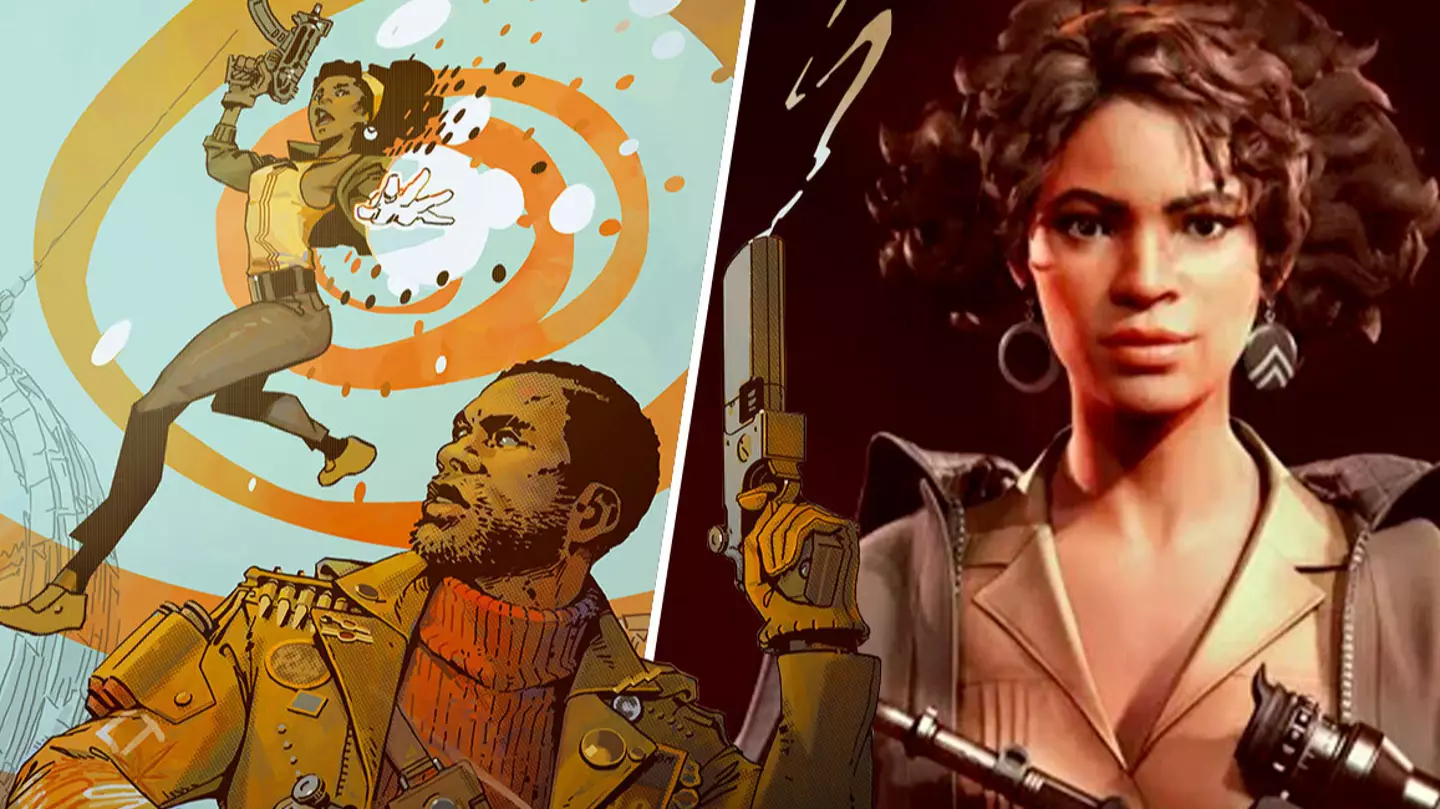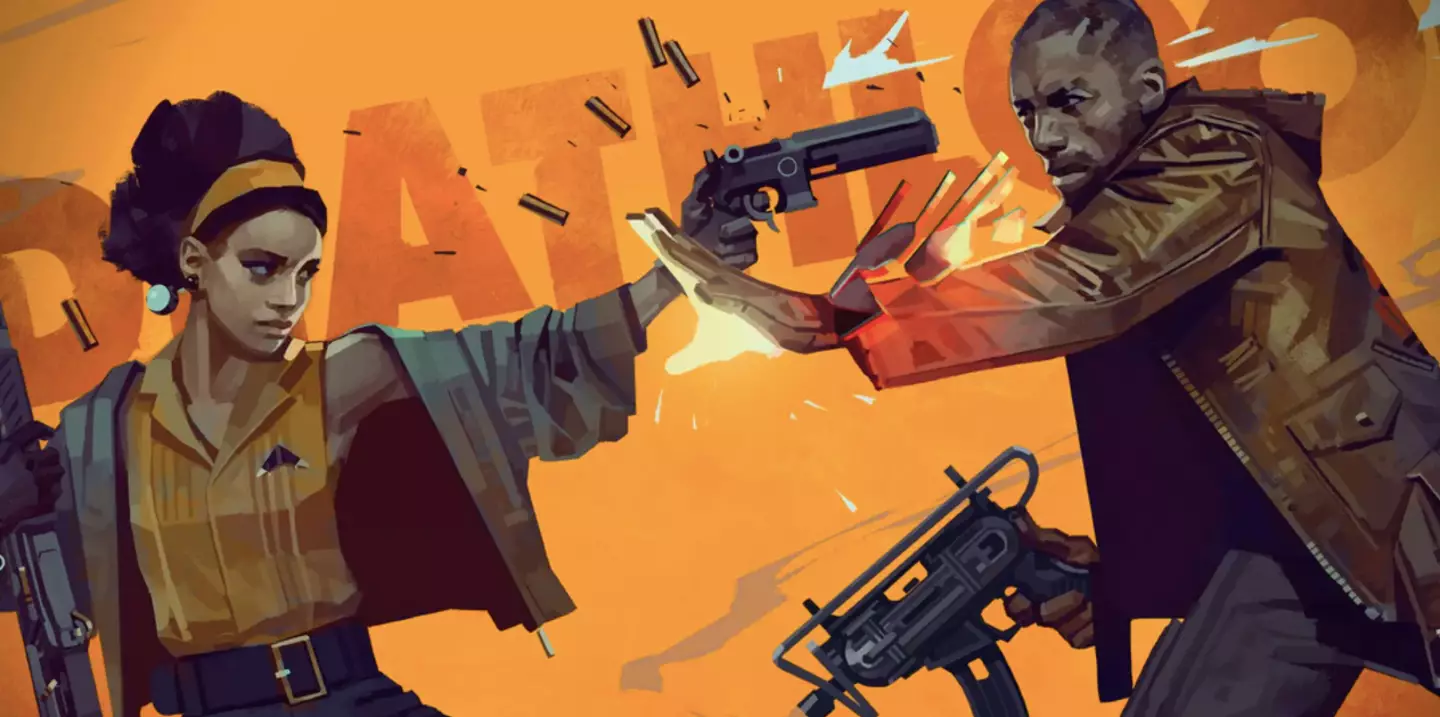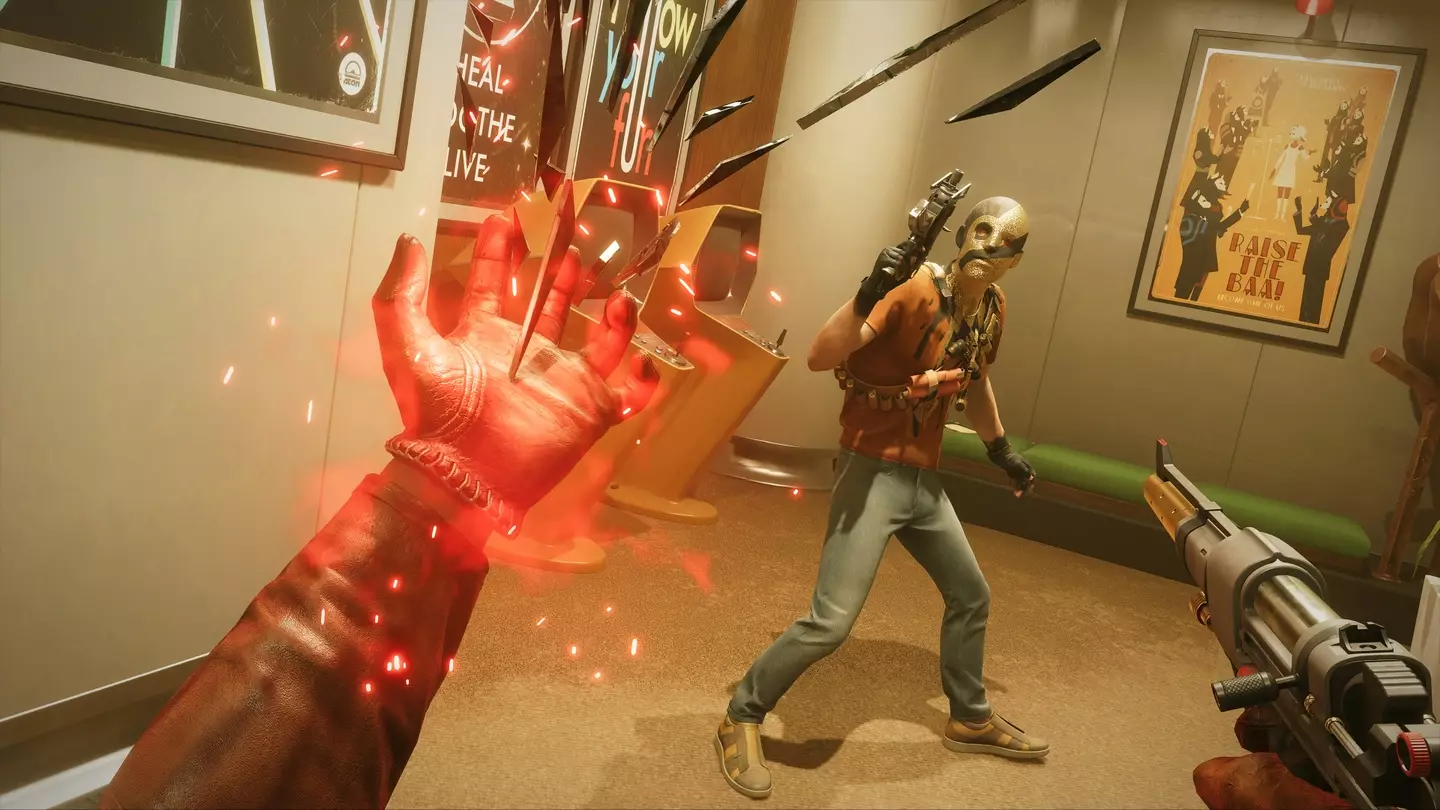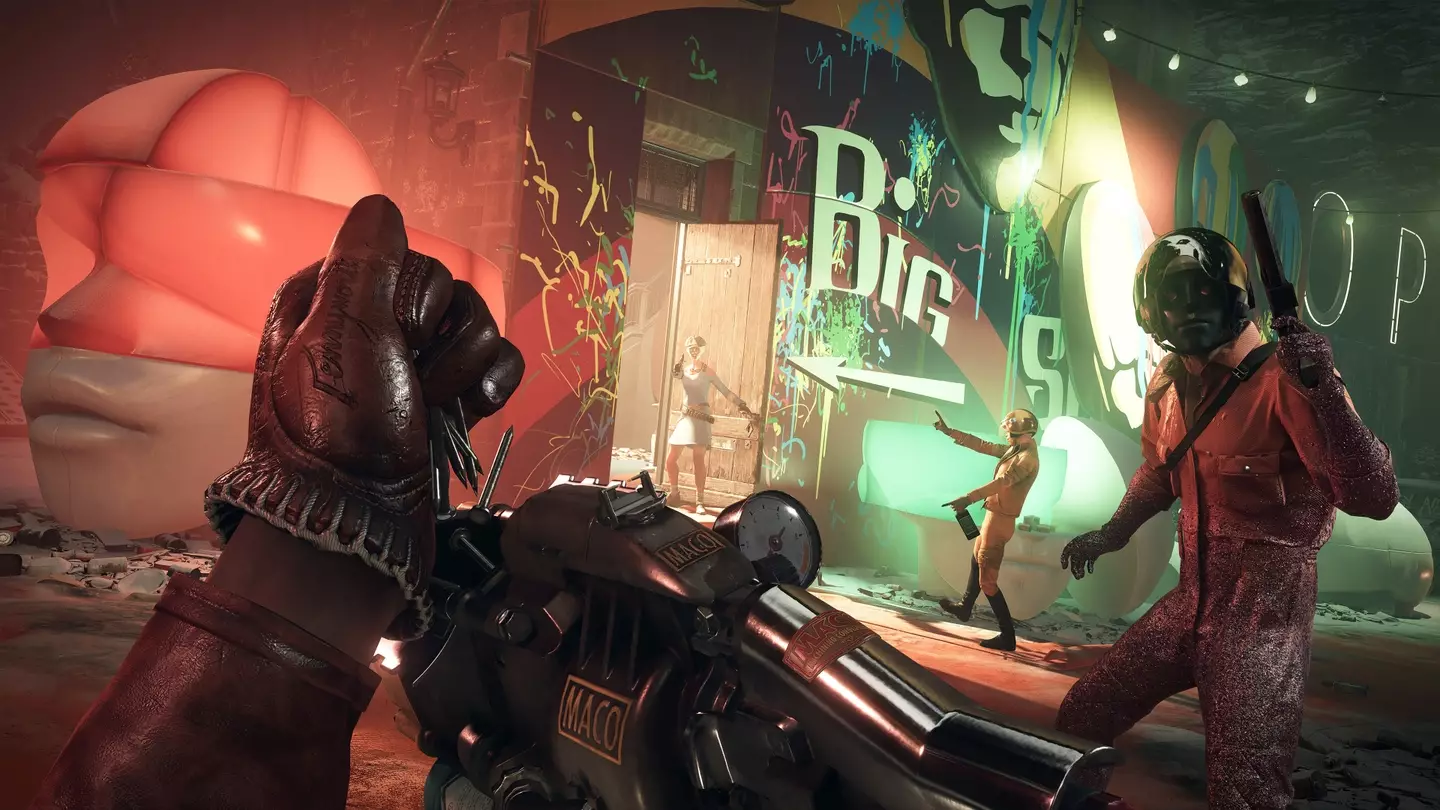
Deathloop is one of the most amazing games of 2021. It’s our PC Game of the Year – it also released as a timed console exclusive for the PlayStation 5, in September 2021 – and also ranked incredibly highly in our overall Games of the Year list. (Spoiler: it's in our top three.) Developed by Arkane Studios (Dishonored, Prey) and published by Bethesda Softworks, it’s an incredibly stylish first-person shooter where you have to use your wits and smarts as well as dealing with your problems via an array of firearms and very pointy things.
It’s something of a detective story, too, as protagonist Colt Vahn awakes in a strange place, ruled by strange people, and soon discovers that he’s stuck in a time loop. The only way out: assassinate the Visionaries who give this place its power. You can read our full review here for more. We caught up with the game’s director (and now head of Arkane Lyon), Dinga Bakaba, after Deathloop’s release to discuss the importance of it featuring a pair of Black protagonists, and more. This conversation is published largely unedited except for minor edits for flow and style.
Watch Deathloop in action in the video below…
GAMINGbible: How's everything been since the release of Deathloop?
Advert
Dinga Bakaba: It’s a relief and, to be quite honest, it went even better than we hoped - that's not always the case. I think the first three days was everyone at home writing on Slack: "Hey, have you seen this?" "Oh, someone has said that!" "Oh this is great!" Those first days, I couldn't sleep watching all the reviews and the streams and all those things. So yeah, relieved. We're pretty happy with how the game was received and we're pretty proud of what we did. It definitely feels good.
GB: Deathloop is one of the most stylish games I think we’ve ever seen. Was that one of the things that you really aimed for? I've don't think I've ever seen a game that leans so much into the fact that it's fashionable. Everything is so highly stylised.
Dinga: It definitely was a goal, but it's also something I hope people have come to expect from Arkane. But I guess yes, we did push the slider all the way to our style this time. It was something we wanted to do from the start. After spending a lot of time in a fictional Victorian-era London (for the Dishonored games), it was nice to create something else. And I think a lot of that comes into the visual style, but it can be felt through the gameplay hopefully, and the story. We wanted to do something a bit more fun. Even if that's like a simple, you know, it could be a meaningless world but what we are going for is something that makes you smile a little bit. This hasn't been an easy period, these last couple of years, for us as developers and I guess it's the same for players. Having something that can make you laugh can give you a rush of colours and shapes thrown at you and tickle your brain in the right way, making you feel smart, these are definitely some things we aimed at for Deathloop.
When I started as a designer, I was more fascinated as a player by very dark experiences. And the more I go, the more I'm interested in other aspects. I still like the action, I still like the tension, the drama; but when a game can make me smile or laugh or just stop to watch something and say, "I don't think I've ever seen something like that," that does something to me. I appreciate it more, so I guess I'm happy that there is some of that in Deathloop.

GB: I put out a tweet a while ago with pictures of characters in games, and how suddenly I’m seeing myself represented where I wasn’t before. Julianna was one of those characters, and you actually retweeted me. Was that representation aspect an important element of Deathloop to you?
Advert
Dinga: Well, actually, the very first version that was pitched by the team didn't have Julianna and Colt as Black characters. And I guess it started with Colt one day. One of the concept artists came with art where Colt was Black. And a few people asked questions, like, "Okay, but we thought it was a game set in the north and on an icy island?" And I think it was Sebastien (Mitton), the art director, who was the champion for Colt. He made a good point. If you're going to have some of those posters that we made for the game, with the ensemble cast of all the targets and Colt and Julianna, he said: "I don't remember a lot of games or movies where the front character of an ensemble cast is a Black character." Like, there are more in movies, but it's not that frequent and there is not a tonne in video games. So, I think it was something that he wanted; and on my side of course I supported it, because it didn't feel like an effort. At Arkane, we've made games with diverse characters before, be it the protagonist or the villains. Actually, the last game that we've made at Arkane Lyon, Dishonored: Death of the Outsider, featured a Black woman.
So, it's something that didn't feel like it would be an effort at first. It was more of an artistic vision, to which we were like, “Yeah, cool." And then the concept art came and it was really cool. You know: "Yeah, I want to play that guy." And Julianna was the same. She wasn't Black at first. At first she was very, I would say, racially ambiguous on purpose. And the more that the concept artist Basile (Moulin) drew her, the more she had, I would say, African-type features, or mixed at least. She just looked so good. Actually, the first character design was with that dress you can unlock, a 1960s dress… She was in her nice librarian dress with her haircut and headband and a huge sniper rifle. And we were like: "Yo, okay, so this is a character that has a lot of personality from the first look." And we embraced it. So yeah, it came from the artists at first.
---
“On the publisher side, I don't think anyone ever told me: ‘Maybe you could change the characters.’ Which is good because I'm not sure I would have loved those conversations.”
Advert
---
Past the initial reaction of people who had their idea of the characters as the first written pitch, I don't think there was any resistance to having those two leads as Black. On the publisher side, I don't think anyone ever told me: "Maybe you could change the characters." Which is good because I'm not sure I would have loved those conversations. When you're creating your game behind your walls, you get used to those characters. You start to feel like they are people. So just like your friends, you will forget their skin colour or at some point, you know - it's just your friends. So, it’s just Colt and just Julianna.
But I guess when I really realised was when we were going to go to E3 to present the game and show the trailer. That was like, "Whoa, yeah. So that's what people will get, and the first impression of the game will lead through these characters." That's what the announcement trailer focused on, you know, the two lead characters. I guess that was a moment where I was starting to get a bit stressed about the reaction of the community. I was a bit anxious, both for the kind of bad reactions you hate to think exist, but they exist, and also the reactions from the Black community - maybe we did something wrong? Or the subject matter of the game, like those two characters, are killing each other. I guess in the end, we were confident because we feel they are great characters. And the way they look is part of it, sure - like it is for anyone - but it's not what defines them. They are great characters. So if, as you mentioned, some people can look at those characters and think, "I admire them, oh, and by the way, they look a little bit like me," and that makes the player feel good, that's definitely a bonus for effort in crafting those two… best enemies.
GB: I think that in games, colour meant character for a long time. And I think it still does a lot of ways. In the ‘90s one of the only real Black characters that had personality was Barret from Final Fantasy VII. And he was directly inspired by Mr. T - they kind of just put Mr. T in the game. It's important and nice, I guess, that games have evolved to the point where the character can just happen to be Black.
Advert
Dinga: Yeah, I agree, and to an extent it makes you question things. Something that some people actually reacted positively to recently was, you know, the main character of Returnal being a middle-aged woman of Greek origin. Like I love that she just happens to be that. I think it's the exact same thing I want. It's not just characters who look like me. It's interesting for me to play as those characters, and you know the game doesn't have to be about it for it to feel fresh. It's odd, like, I hope at some point it stops being fresh, like that would be the goal, that it stops being fresh, but it's still fresh. And it made me think about things like the characters' jobs, for instance: what would they do in life when they are not saving the world? And we've seen a lot of scientists, people in the military, like Colt is a captain. We've seen, you know, kings and plumbers. But look how much plumber sticks out, how unique it is, and how it's also part of the gameplay with the pipes. You can imagine another character, but it works for him quite a bit. And I think that's something that sometimes we might be missing, you know - a character that has a job or an origin or, you know, a type.
I remember pitching a game at a company I used to work for, and we needed a super-fast character, like a speedster. And the concept artists' first try was to make him a bit overweight, a kind of nice-looking guy in a sweater and sportswear. And this is exactly not what you were imagining when you were writing your speedster, but it gave him so much immediate personality. So, in general, I hope this is something that is explored a bit more - more facets of life, and the stories of coming from those perspectives could be interesting. And if that's not what the story is about, it still gives this authenticity, I guess, to the industry as a whole, not a specific product. The industry will become more legitimate as an art form if it has diverse points of view and characters, and locations. Like, we could talk about locations as well. Not enough games are set in Africa, if you ask me.

GB: Absolutely. There are just not enough.
Advert
Dinga: Yeah definitely, but then you could talk about culture and myth and history - there is a lot to explore. Someone mentioned to me recently that they couldn't remember a lead protagonist of South Asia Indian origin in a mainstream AAA game. I mean, the closest thing would be Far Cry 4 in Nepal. But I think he's half-American, though. So anyhow, you see my point: there is something to be explored. I remember when I was a game design student, looking at mythologies and where you would want to place a game. One of the things that I wrote down and I never explored, because I think it's one where I would need a lot of research, would be Indian mythology. Like the Mahabharata and all those things. There is so much to be explored, to make new stories, and make the industry more representative of what life on Earth looks like. If one day video games are how aliens study the human race, we probably want to get to beat of everyone in there, right?
GB: Do you think people will look at Deathloop and attempt a similar sort of representation in the future? What do you hope other developers take from this game, into their own work?
Dinga: I mean, I play a lot of games myself. And as a consumer, yes, I'm happy to see more [diverse] characters, but I also feel that it's good when they come from the creative vision of the team like everyone else. But overall, yes, I'd welcome more. Will it be the case? I have no clue. I really don't know. How people will look back at Deathloop in five years, when they will be making decisions?
Overall, I'm not too worried because when I look at the indie game space, and I see a lot of diverse characters - and let's be honest, we AAA devs do take a lot of inspiration from indie games. A lot. It influences our work a lot and our creativity. It's so present in indie games that I don't see how it wouldn't ripple on to triple-A and more mainstream games. To me, Deathloop aside, I would expect this to continue and to be more and more natural. That's the point. Actually, a piece of trivia: what do you think Frank Spicer's ethnicity is? He’s one of the main targets in Deathloop, people know his face. He's been in trailers, but could you answer that question?
---
“I hope that AAA games take inspiration from the indie world on the ability to say, yes, we are trying to make something very accessible and that appeals to a large audience. But that doesn't mean that it has to be expected.”
---
GB: I don't think I could.
Dinga: And that's interesting to me because he's clearly not white. But I mean, no one seems to have even asked the question, which is great. It means it means he's a character - he's just Frank, and I hope it becomes as natural as that for NPCs. But for leads and antagonists, yes, we'll get there, I hope. Maybe my mind will change later on, when there is more digestion, but at this point [I like] the fact that you can make something complex and, to an extent, personal. And I don't mean personal like Dinga and Sebastien - I mean, personal for a studio. Like, it expresses a lot of the studio's personality, and it has a lot of individual and collective personalities in it. It's very flavoured - you might not like it, and we take the risk that you might not like it.
And I hope that AAA games take inspiration from the indie world on that - on the ability to say, yes, we are trying to make something very accessible and that appeals to a large audience. But that doesn't mean that it has to be expected. You can put some personality in it; you can put some risk both in the gameplay and narrative; and, you know, [make] choices on representations or settings or themes and still appeal to a large audience.
If movies can tell us anything it's that there have been some blockbusters that were the first of their genre, in genres that hadn’t had blockbusters before. That's a weird discussion to have, especially like I don't want to be bragging or anything about the quality of the game, but I always felt that if you come with something unique, and different and odd - even weird, why not - but it's high quality, and people can regroup on the quality, it will make more people willing to try it. I mean, there are a lot of movies I would never have cared about because of their subject matter if it was not for a great actor or a great director, or glowing reviews or word of mouth. So that's the thing: hopefully people feel more comfortable with taking some risks. And you know, when a lot of games are doing it, we are not the only example. I hope that this will be part of that conversation. That's what I hope people take away.
Also, immersive sims are fun. You play them without necessarily wanting it to be a perfect string of actions. Arkane makes a specific type of game - what is Deathloop's message on that type of game? The message is to learn to embrace mistakes and creativity in playstyles, it makes all games even more fun.

GB: Finally, if you could time travel back to the first day of active development of Deathloop, and leave something on your desk and then disappear and come back to the present, what would you leave?
Dinga: Can I can I leave a printout of the game’s Metacritic page? All the things we discussed about creativity and taking risks, that's not easy. That's not easy by any means. And I'm looking for something as a way to encourage younger people to believe in themselves and their team. So, the Metacritic page would be one way, but that's too much - it spoils too much. It will change the timeline. So, I guess this [holds up a coin]… a little coin that we made. It has “Deathloop” on one side, and "If you don't succeed, die, die again" on the other side. Because the message would be: "You'll get through this." And it's something you'd like to keep on your desk to remember for the rest of your life. So yeah, that probably that. It doesn't say too much.
Thanks to Dinga for speaking with us. You can find more on Deathloop on GAMINGbible, here.
Featured Image Credit: Bethesda Softworks, Arkane StudiosTopics: Interview, Deathloop, Best of 2021, Bethesda